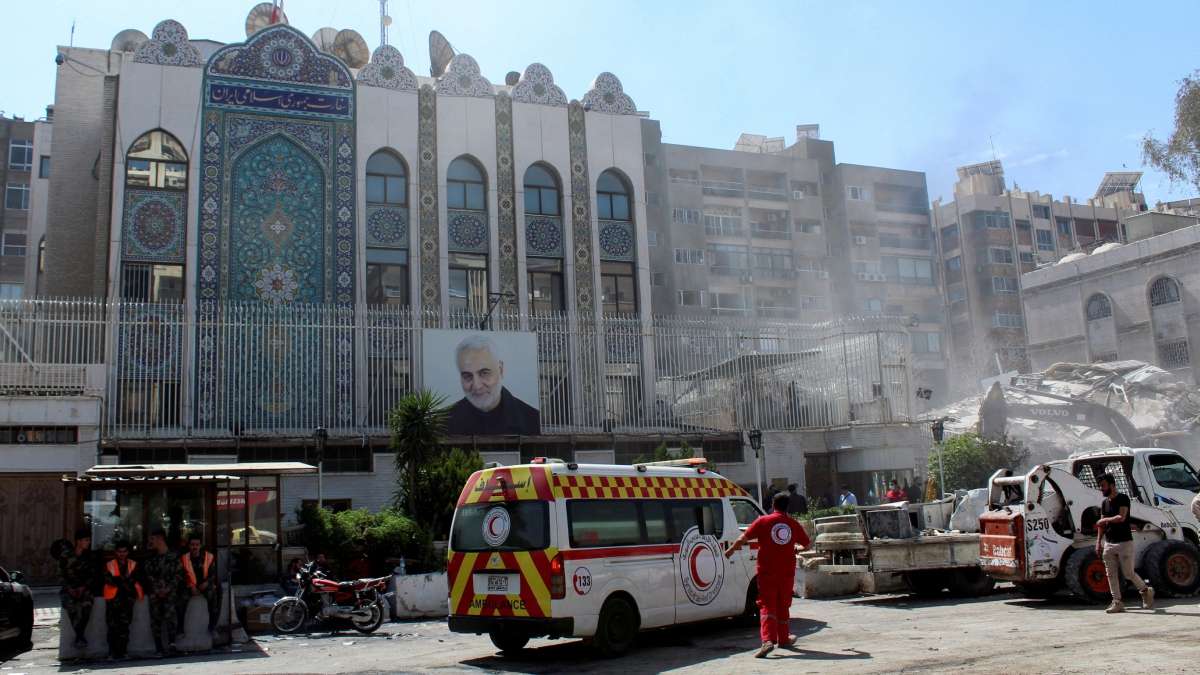CIA warns Israel of Iran’s possible retaliation within 48 hours for consulate attack in Syria
[ad_1]

Washington: The US Central Intelligence Agency (CIA) has warned Israel that Iran could launch a major military operation within 48 hours in retaliation for an apparent Israeli airstrike that destroyed an Iranian consulate in Syria, killing dozens of Iranian officials and generals, according to media reports. This comes as Iranian leaders have promised to hit back at Israel, with President Ebraham Raisi saying that the attack “will not remain without answer.”
The US is concerned the deadly strike in Damascus could trigger new attacks on American troops by Iranian-backed militias in Iraq and Syria, said Lt Gen Alexus Grynkewich, the top US Air Force commander for the Middle East. By attacking an Iranian diplomatic station, Israel’s apparent escalation has raised fears that the devastating six-month war against Hamas could spill over into the entire Mideast region and beyond.
On top of that, the United States, Britain and France on Wednesday opposed a Russian-drafted UN Security Council statement that would have condemned an attack on Iran’s embassy compound in Syria. The three countries said many of the facts of what happened on Monday in Damascus remained unclear, while Israel is yet to claim responsibility for the attack.
The strike, in the Syrian capital of Damascus, killed 12 people, including senior commanders of Iran’s Islamic Revolutionary Guard Corps for Syria and Lebanon, an officer of the powerful Iran-allied Hezbollah militia in Lebanon, and others. Grynkewich said Iran’s assertion that the US bears responsibility for Israeli actions could bring an end to a pause in militia attacks on US forces that has lasted since early February.
US worried about Iranian retaliation, wider conflict
Iran’s Islamic Revolutionary Guard Corps (IRGC) said in a statement that seven Iranian military advisers died in the strike including Mohammad Reza Zahedi, a senior commander in its Quds Force, which is an elite foreign espionage and paramilitary arm. Hezbollah offered condolences to Iran for Zahedi’s death and called Israel “foolish when it believes that liquidating the leaders can stop the roaring tide of the people’s resistance”. A member of Hezbollah, Hussein Youssef, also was killed in the attack.
The Biden administration insists it had no advance knowledge of the airstrike on the Iranian consulate on Monday, but Washington is closely tied to Israel’s military regardless. The US remains Israel’s indispensable ally and unstinting supplier of weapons, responsible for some 70 per cent of Israeli weapon imports and an estimated 15 per cent of Israel’s defence budget.
Analysts say that if Israeli Prime Minister Benjamin Netanyahu’s recent broadening of targeted strikes on adversaries around the region to include Iranian security operatives and leaders deepens regional hostilities, the US may be unable to avoid being pulled into a deeper regional conflict as well. Multiple arms of Iran’s government served notice that they would hold the United States accountable for the fiery attack.
Current and former US officials have called the strike a strategic blow to Tehran and that it may risk an escalation of tensions in the region, according to the New York Times. Ralph Goff, a former senior CIA official who operated in the Middle East, called the alleged Israeli strike “reckless,” adding that “it will only result in escalation by Iran and its proxies”. However, he said the attack was in line with Israel’s strategy to weaken the IRGC.
Sabrina Singh, a Pentagon spokesperson, emphasised that the US played no part in the strike and wanted to avoid an escalation. “Tensions being high in the region, we wanted to make it very clear in private channels that the US had no involvement in the strike in Damascus,” she said.
Iran promises ‘revenge’ against Israel
Meanwhile, Iranian leaders on Wednesday reiterated their calls for revenge after the apparent Israeli airstrike. Supreme Leader Ayatollah Ali Khamenei said Israel will continue to fail on the battlefield in Gaza, and its defeats will bring it closer to collapse. “Desperate efforts like the act they committed in Syria will not save them from defeat and they will be slapped for the action, too,” Khamenei was quoted as saying by the official IRNA news agency.
In Syria, a funeral was held for the slain Revolutionary Guard members at a holy Shiite shrine in Damascus, media reported. The main funeral ceremony will be held Friday in Iran during an annual pro-Palestine rally, called al-Quds Day. The deadliest strike on an Iranian diplomatic site in decades appears to signify an escalation of Israel’s targeting of Iranian military officials and their allies in Syria.
Iran-backed militias had refrained from attacking US bases in an apparent attempt at de-escalation after three US troops were killed in a drone strike in Jordan in January. In retaliation, the US launched a massive air assault, hitting more than 85 targets at seven locations in Iraq and Syria, including command and control headquarters, drone and ammunition storage sites and other facilities connected to the militias or the IRGC.
Since the war broke out on October 7, Israel has escalated its strikes on Iran-linked terror targets in Syria and Lebanon, reportedly killing numerous IRGC operatives, as well as members of Hezbollah and other Iranian proxy groups. It has launched close to 25 airstrikes in Syria, killing several people.
As criticism has grown of US military support of Israel’s war in Gaza, State Department spokesman Matthew Miller has increasingly pointed to Israel’s longer-term need for weapons — to defend itself against Iran and Iranian-allied Hezbollah in Lebanon. Israel for years has hit at Iranian proxies and their sites in the region, knocking back their ability to build strength and cause trouble for Israelis.
(with inputs from agencies)
ALSO READ | US: Muslim leaders refuse to attend Biden’s Ramadan dinner amid anger over support to Israel in Gaza
[ad_2]
Source link
